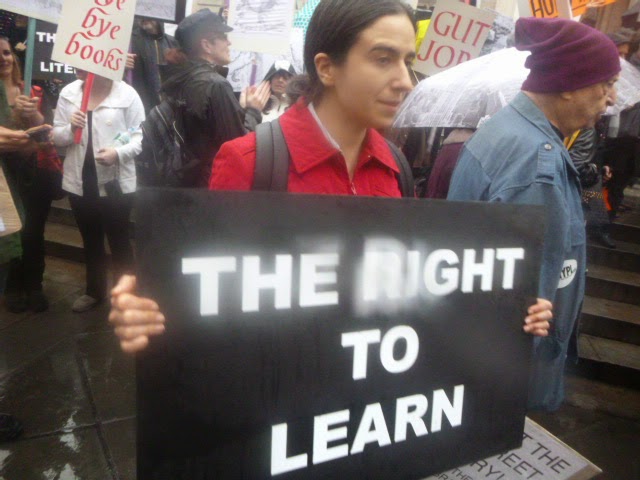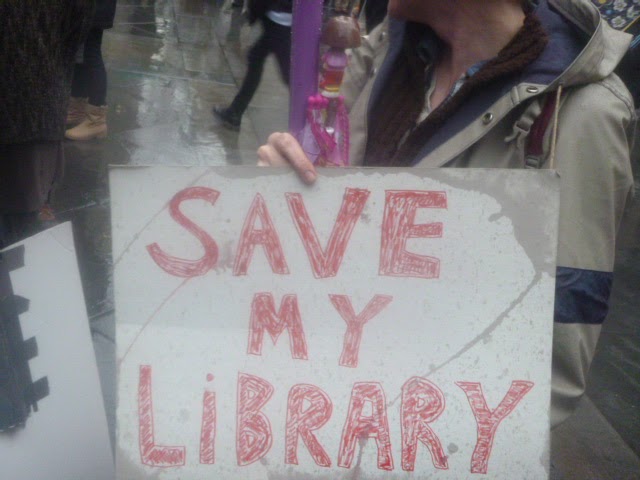It was an amazing
week for the movement to save the NYPL.
Tuesday the Illuminator projected messages in support
of preserving the NYPL, not shrinking it.
Earlier in the day, the City Council expressed some concerns about the
plan. And the movement to support it grew in all circles.
Wednesday, I rode through the rain to the rally at 42st Street, where the Board of Trustees for the Library were meeting.
A press release declared:
Wednesday, I rode through the rain to the rally at 42st Street, where the Board of Trustees for the Library were meeting.
A press release declared:
Committe to Save the New York Public Library- Rally
What: Rally to save the 42nd Street Library
and Mid-Manhattan Library at NYPL
Trustees Meeting
Where: 5th Avenue entrance to the 42nd Street Library (5th Ave and 41st St.)
When: Wednesday, March 12, 5:00 – 6:00 PM Rain or Shine
Press contact: Charles Warren 212 689-0907
Trustees Meeting
Where: 5th Avenue entrance to the 42nd Street Library (5th Ave and 41st St.)
When: Wednesday, March 12, 5:00 – 6:00 PM Rain or Shine
Press contact: Charles Warren 212 689-0907
LIBRARY ADVOCATES RALLY
OUTSIDE NYPL TRUSTEES MEETING; $150 MILLION IN CITY MONEY AT STAKE
National Book
Award-winner Jonathan Lethem: “The humans of New York seem to be rousing
themselves to a collective understanding: that the great public institutions
they boast of and rely upon can’t be entrusted to the stewardship of
real-estate developers, corporate synergists, media barons, and other
ostensibly well-intentioned, deal-drunk one-percenters. Instead we need to
tend our own commons, large and small — individual libraries, and the city
itself. The election of De Blasio and the current outcry against
the disastrous NYPL ‘renovation’ (scare quotes essential) represent two
expressions of the same urgencies. Now it waits for De Blasio himself to
close the circuit.”
Last July, Bill
de Blasio stood on the steps of the 42nd Street Library and called for a
halt to the Central Library Plan. The plan would cost $350 million ($150 million
of which would come from New York City taxpayers) and irreparably damage
the 42nd Street Library – one of the world’s great research libraries and
a historic landmark. The plan also calls for the sale of the Mid-Manhattan
Library at 40th and Fifth Avenue, the most heavily used library in the
city.
“With this rally,
we’re returning to the library steps and asking Mayor de Blasio to
follow through on his commitment,” said translator and Committee to Save
the New York Public Library member Susan Bernofsky. “Instead of spending
$150 million of taxpayer funds on this wasteful and destructive project,
he should reallocate that money to support branch libraries across the
city!”
“They’ve already
emptied out the 42nd Street book stacks. On Saturday, every book in the
catalog that I wanted to see was off-site. From a research perspective, it was
an utter disaster; not a single one was available. Our new mayor could
block the city funding of this debacle – I really hope he follows through
on his commitment,” said Theodore Grunewald , also a member of CSNYPL.
The New York
Public Library administration plans to demolish the 42nd Street
Library’s historic seven-story book stacks, install a circulating library
in their place, and send 1.5 million books to storage in central New
Jersey. The new circulating library would replace the Mid-Manhattan
Library and the Science, Industry and Business Library (at 34th and
Madison), despite being less than one-third the size of the two existing
libraries.
This plan was
created through a closed process with no public input, and has been
condemned by leading architecture critics such as Ada Louise Huxtable in the Wall Street
Journal and Michael Kimmelman in the New York Times.
condemned by leading architecture critics such as Ada Louise Huxtable in the Wall Street
Journal and Michael Kimmelman in the New York Times.
An open letter
from the Committee to Save the New York Public Library to NYPL president
Tony Marx opposing the plan was signed by Mario Vargas Llosa,
E.L. Doctorow, Salman Rushdie, Tom Stoppard, Lorin Stein, Jonathan
Galassi, Jonathan Lethem, Art Spiegelman and many other eminent cultural
figures. More than 4500 people so far have sent messages to Mayor De
Blasio as part of an on-going email campaign opposing the plan and
citywide sales and shrinkage of
libraries: www.savenypl.org/email-the-mayor
There I met a cacophony of library
supporters. Some holding defiant
signs. Others in street theatrical carb. Others
passed out flyers and called for people to write to De Blasio’s office asking
him to stop the plan. “Don’t gut the
42nd Street Library! Don’t Sell the Mid-Manhattan read their
signs. My friends Leslie and Peter were
there.
"Save our stacks, Bring the Books Back!!!" people were chanting.
Zack was moving about the crowd. A young women held a sign declaring “research is a human right.” I asked her about it. She explained she used the library all the time as a poet and teacher. That’s just it.
Zack was moving about the crowd. A young women held a sign declaring “research is a human right.” I asked her about it. She explained she used the library all the time as a poet and teacher. That’s just it.
So many people use
the various branches of the NYPL. They
represent the expanding possibilities of knowledge and transformative
possilities of information for people’s lives.
The most moving scenes of Dallas Buyers Club take place when Matthew McConaughey
is looking up information about drugs which will save his life. You see this rhodeo cowboy transformed in
front of our eyes, becoming a treatment
activist, with every new bit of information. Ignorance = Death, Knowledge is Power. Literacy
is a key to our public life. And this
comes from the simple idea of regular people having access to the library where
they access it.
Seminal queer
theorist Gayle
Rubin talks about the day she dug through the stacks of her college
library, digging up the citations referring to lesbians in literature, and
beginning the research which would become queer theory.
My
senior thesis was shaped by two unrelated events. I came out as a lesbian and
took my first anthropology course. When I came out in the spring of 1970 the
first thing I wanted to do was read books on lesbianism. So I went to the
library and I looked up lesbian in the card catalog. There were two entries: The Well of
Loneliness by
Radclyffe Hall and The Grapevine, by Jess Stern, a study of the
Daughters of Bilitis. [3] Naively, I went bounding over to the
reference desk and said, "Hi. I don't understand this, I can't find
anything on lesbianism in the card catalog." A couple of the librarians
blanched, and no one seemed to have any suggestions. But I went back to looking
through the card catalog, and every so often someone would tap me on the
shoulder and sort of whisper in my ear, "Hey, you should go look at X
place." It was some closeted gay librarian telling me where to look! To
make a long story short, there were large deposits of information on lesbianism
in the library, if you knew where to go. For example, there was material in the
sections on "women philanthropists" and "women in prison."
And the Labadie Collection had all kinds of gay and lesbian publications. [4] The holdings of the Labadie collection
were cataloged separately and not listed in the main library catalog, but it
turned out to contain just about every important gay or lesbian publication
available at the time. The Labadie had The Ladder, as well as Gene Damon/Barbara Grier's
bibliographies of lesbian literature and Jeanette Foster's Sex Variant
Women in Literature. [5] I spent hours up in Labadie reading
old issues of The
Ladder, and decided I was going to do my honors thesis on lesbian
literature and history.
The aspiring
scholar needed the library, the librarians to be there, to help lead the way.
 |
| Disappearing-libraries-The Reading Room at the British Museum where Karl Marx was a frequent visitor c. 1925. |
Information can be
unsetting and vexing. Social movements are born in these spaces. Afterall, the library stacks are places for secrets,
survival and adaptation. These are spaces where ideas are translated through
the years. Here, immigrants come to
learn English, those without air conditioning come to beat the heat, and those
trembling come to beat the cold. In
short they are our public commons. And
attacks on them are nothing short but an expansion of the generation long
attack on the poor and ideas. The
privatization of libraries, selling them off is part of the dumbing down of
America.
These attacks are
assaults on information and different kinds of knowledge. And most certainly, the digital adaptation of
information is no panacea; it is certainly not guaranteed to be preserved.
“The closing of the libraries is
something akin to book burning, IMO,” noted my friend Donald
Grove, on a conversation on facebook. “I am suspicious of the
promise that everything available in print will still be available
electronically. The people who make those promises have interesting visionary
hopes for technology, on one hand, and little willingness to accept the
venality of power, on the other. Fahrenheit 451. Yes.”
Yet, more and more people seem to be
getting this point and are standing up against this plan. Grove and his quirky friends continued a
spirited conversation on facebook.
“Until they can make a Kindle ™
smell like a 20-year-old book, I am not interested in technology replacing
books,” noted Allen Foster. “Maybe not even if they can.”
“They're in league with the Cretans
who think we can all stop learning because we've got Google,” noted Emile Messpots.
“Keeping the books and creating the
electronic form of the books would be a much better solution,” Allan Bowhill chimed
in, echoing a point educators have been making for a long time. There is no guarantee any of our electronic
books will still be accessable five, ten, fifteen years from now. Like the 8- track and cassette tapes, these
tools become obsolete. But the printed
word does not.
“Allen, I remember you and I
spending some lazy weekend afternoons at the Urbana Free Library, back when
That 70's Show was real life...” Grove continued.
As Gayle Rubin’s stories and Donald
Grove’s recollections suggest, these are places where people find themselves,
connect their lives with other stories, and become who they are. We need room in these spaces for our big
imaginations to grow. Without these spaces,
there is often little room for the ideas to flourish. I do hope there is still room in this busy
city for a few daydreams in the stacks.



































No comments:
Post a Comment